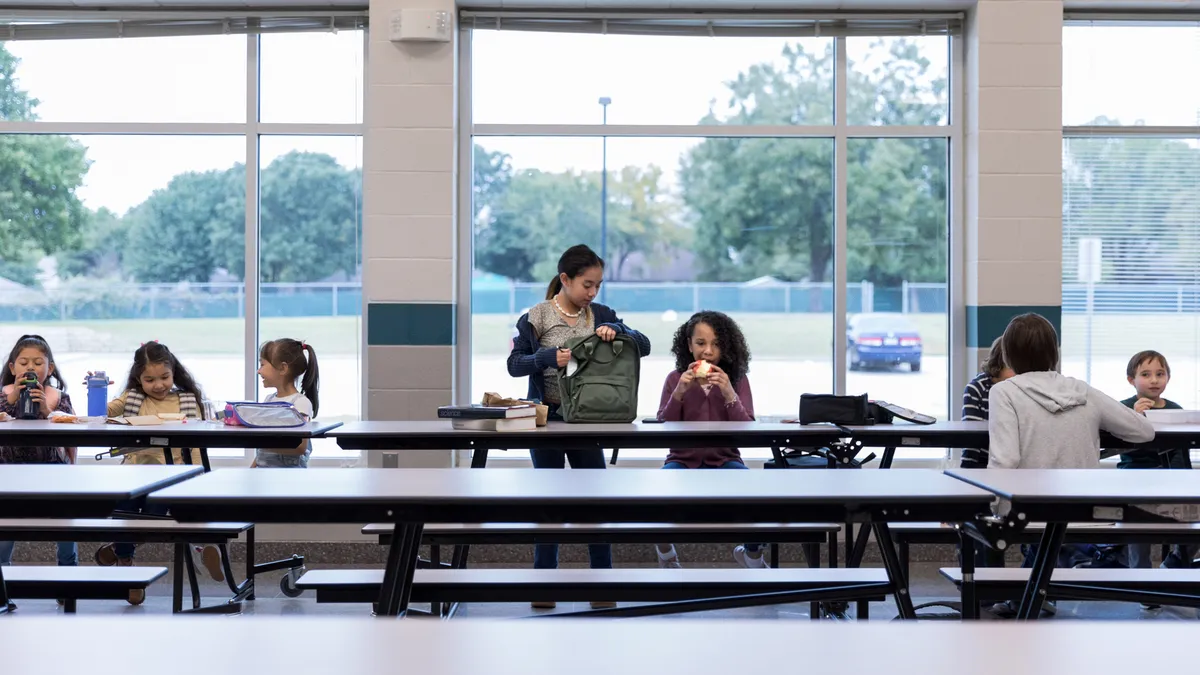UPDATE: June 27, 2022: President Joe Biden on Saturday signed into law the Keep Kids Fed Act, thereby extending universal free meals for children this summer and extending some school meal waivers through the 2022-23 school year.
“Our action today staves off a dangerous hunger cliff: ensuring universal free meals for all children throughout this summer, while helping schools keep up supply chain snags and rising costs for the upcoming school year,” said House Speaker Nancy Pelosi in a statement after the bill's passage Friday in the House and Senate.
Dive Brief:
- A bipartisan, bicameral group of four congressional leaders on Tuesday introduced an 11th hour bill, aiming to continue some of the federal pandemic school nutrition waivers set to expire June 30. The $3 billion Keep Kids Fed Act package is budget neutral, meaning it would not increase net federal spending.
- For the 2022-23 school year, the legislation would extend summer meal program waivers, continue no-cost waivers like relaxed nutritional standards to help with supply chain disruptions, and increase federal reimbursement rates for school lunch by 40 cents and breakfast programs by 15 cents. Students who are eligible for reduced-price meals would receive free meals, too.
- However, the legislation would not continue the universal free school meals that families and schools have become accustomed to for the past two pandemic years. Families would once again have to apply for free and reduced-price meals to determine eligibility.
Dive Insight:
While the bill would not fully extend child nutrition waivers spurred by the pandemic, child nutrition advocates are nonetheless urging its passage before the waivers expire entirely in a little over a week.
“The provisions in the legislation are only temporary and do not go as far as we would like, but they are a critical first step to help shield some of the impact of inflation, supply chain disruptions, and labor shortages,” said Luis Guardia, president of the Food Research & Action Center. “Hungry children can’t wait.”
School nutrition directors have faced supply chain woes, increasing costs and labor shortages throughout the pandemic, said Beth Wallace, president of the School Nutrition Association, in a statement.
“With crucial federal waivers on the verge of expiring, this agreement offers school meal programs a lifeline to help build back toward normal operations,” said Wallace, who is executive director of food and nutrition services at Jefferson County Public Schools in Denver.
The bipartisan, bicameral bill was introduced by Rep. Bobby Scott, D-Virginia, Rep. Virginia Foxx, R-North Carolina, Sen. Debbie Stabenow, D-Michigan, and Sen. John Boozman, R-Arkansas. Scott and Foxx are chairman and ranking member, respectively, of the House Education and Labor Committee. Stabenow and Boozman are chairwoman and ranking member, respectively, of the Senate Agriculture, Nutrition and Forestry Committee.
Their bill follows a stalled bipartisan bill introduced earlier this year by Stabenow and Sen. Lisa Murkowski, R-Alaska, that sought to keep universal school meals in place through September 30, 2023.
“Time is running out! My agreement with Senator Boozman, Representative Scott and Representative Foxx will help keep kids fed and is fully paid for,” said Chairwoman Stabenow regarding the latest bill in a statement. “With 90 percent of our schools still facing challenges as they return to normal operations, this will give our schools and summer meal programs much-needed support to deal with ongoing food service issues.”
Foxx added the Keep Kids Fed Act will help schools get through supply chain issues and inflation.
“This budget-neutral legislation will also put our country’s school nutrition programs back on the right track and keep the permanent pandemic narrative from being used to expand school meal programs beyond their intended purpose,” Foxx said. “This legislation will uphold our responsibility to taxpayers and abide by the principle that aid should be targeted and temporary while also helping students truly in need.”
With a hazy future in sight for continuing universal school meals, state efforts have grown to secure policies providing every student with a free breakfast and lunch.
In the meantime, districts that do and don’t have universal school meals in their state have been bracing for a world without any waivers. Nutrition directors are expecting school meal prices to rise given higher food costs due to inflation and ongoing supply chain and labor shortage issues.












